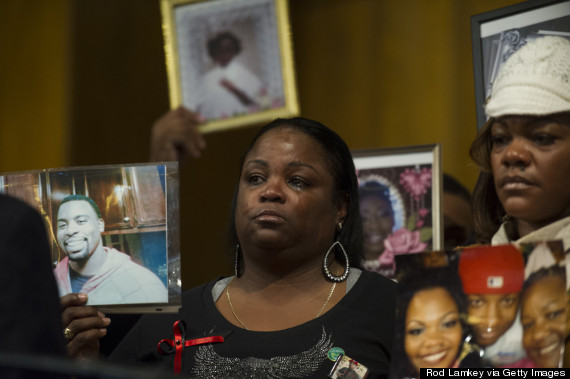2013 was a big year for the rights of immigrants, workers, women and children in California. The most populous state in the nation, led by Gov. Jerry Brown (D) and a Democratic supermajority in the state Legislature, California this year passed groundbreaking laws that bucked the national trend of restricting abortion rights, rebuked the federal government's aggressive deportation program and led the country on workers' rights.
But 2014 is going to be even better -- that's when the laws start going into effect. Take a look at some of California's landmark laws from this past year below.
TRANSGENDER RIGHTS
TRANSGENDER RIGHTS
In a nationwide first, transgender students in California will be able to choose which restrooms they want to use starting in January. They will also be able to choose between boys' and girls' sports teams.
California is the first state to enact these policies as a state law, but the groundbreaking legislation, which goes into effect Jan. 1, could be suspended within days if opposition groups gather enough signatures to test the law before voters on the November ballot.
PAPARAZZI REFORM
Paparazzi photographers who harass and intimidate celebrities and their children will face stiffer penalties under a new law passed in 2013: a fine of up to $10,000 and up to a year in county jail. Victims can also sue for damages and attorney's fees, according to the Associated Press.
Before the bill passed, celebrity moms Halle Berry and Jennifer Garner joined forces to deliver some emotional testimony about how aggressive photographers regularly frighten their children.
"My 17-month-old baby is terrified and cries," said Garner during the August hearing. "My 4-year-old says, 'Why do these men never smile? Why do they never go away? Why are they always with us?'"
ABORTION RIGHTS
California's new law authorizes nurse practitioners, certified nurse midwives and physician assistants to perform aspiration abortions during the first trimester.
California joins Oregon, Montana, Vermont and New Hampshire in allowing nurse practitioners to perform early abortions, the AP reported. In 2013, California was the only state to enact a law expanding abortion access, The New York Times noted.
Legislators also strengthened an existing law that makes it illegal to damage or block access to abortion clinics, the AP reported.
MINIMUM WAGE
California's minimum wage will go from $8 an hour to $9 in July, and it will reach $10 an hour by 2016. California joins 12 other states that are raising their minimum wage in 2014.
TEXTING LOOPHOLE CLOSED
A legislative loophole made it possible for teens to use voice commands like Apple iPhone's Siri to text while driving, and California's lawmakers closed that loophole this year. Adults will still be able to use the hands-free texting feature while driving.
Teens have been banned from using cell phones on the road since 2007, but an apparent loophole opened up in 2012 when legislators passed a bill allowing drivers to use hands-free devices to send text messages and perform other functions, according to the AP.
GUN SAFETY LAWS
California already has some of the strictest gun laws in the country, but lawmakers cracked down even further with laws that strengthen assault weapon permit requirements, require licensed psychotherapists to tell police about patients who threaten violence against others, and make it illegal to purchase gun parts that convert firearms into assault-style rifles.
The bills were written in reaction to mass shootings across the country, including the December 2012 Sandy Hook Elementary School shooting in Newtown, Conn. In contrast, the federal government hasn't been able to pass any gun safety laws since the Newtown massacre.
DOMESTIC WORKERS BILL OF RIGHTS
California joined New York and Hawaii in creating statewide protections for domestic workers in 2013. California's law allows domestic workers like nannies and personal health care aides to claim overtime wages for more than nine hours of work a day or 45 hours of work a week.
The law is expected to affect about 100,000 workers, but it's only temporary --legislators will have to vote on whether to renew the law in 2017, KPCC reported. It's also a pared-down version of the bill that was originally proposed in 2011, which included meal and rest breaks.
IMMIGRATION REFORM
The federal government is stalling on immigration reform, and Gov. Jerry Brown made it clear that California isn't going to wait around any longer. Brown signed into law a group of bills this year to protect undocumented immigrants, the most significant of which is the Trust Act.
The Trust Act limits local police's cooperation with the Department of Homeland Security's Secure Communities, a federal deportation program that asks police departments to screen arrestees for immigration status and hold them for the feds if they're found to be undocumented. So far, Secure Communities has deported 100,000 Californians, most of whom did not have a serious criminal record, the Los Angeles Times reported, but the new law will require people to be charged with or convicted of a serious offense before being held for possible deportation by the feds.
Starting in 2015, California's undocumented immigrants will also be able to apply for driver's licenses. California joins Illinois, Colorado, Nevada, Maryland, Connecticut, Oregon, and the District of Columbia in passing the driver's license legislation in 2013, MSNBC reported. New Mexico, Washington and Utah also allow undocumented immigrants to apply for driver's licenses.




